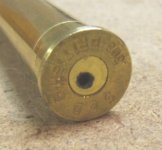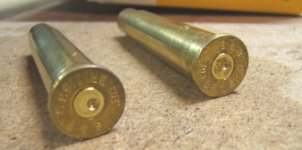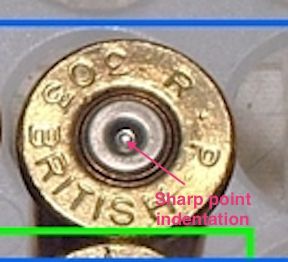OK, a question or two on an odd pair of incidents today at the range.
The Bubba’d No5 ("jungle carbine") I rescued has only been fired with my handloads. Its been checked for lug engagement (its fine even & about 40% on both). Headspace it passes both the Okie NO-GO (0.067") & obviously the FIELD (0.074"). The bolt head is a No “0”. Not surprising as the bolt & receiver serial numbers match. Checking the FP protrusion, it mics to 0.048”, a little long, but within tolerance for the 0.040”~0.050” range listed.
Weather at the range was cool & damp with a light mist so there were no temperature concerns.
Working up a load for this rifle using virgin R-P brass & CCI #200 primers has functioned perfectly with absolutely no issues. FWIW the loads were 150 Gr & 174 Gr Hornady & Sierras run to moderate pressures & velocities. This is a 60 or so rounds in a few lots, as the load was being developed.
Until today these were the only loads run through this particular rifle, but today I tried some S/A MilSurp “7.7 ~ R1M3Z ~ A81” ammo which I’ve previously used other rounds from in the no4MK2 with no problems at all.
I immediately started getting odd results. On round 3 (1&2 were fine) something struck my thumb, which is odd! Looking at the action after firing, but before cycling, the bolt it was fully cocked, even though the trigger had been pulled & the striker detonated the cap & fired the round. ? Hmm, odd. Once I de-cocked & opened the action the primer was pierced. I assume the venting gas actually forced the striker back & the sear caught the bent!
I stopped & checked everything out & cleaned the mess as the gas had vented through the ports in the bolt head & receiver ring.
The next 3 rounds were normal, then another pierced primer.
Finally I fired & the bolt attempted to open fully! This was NOT the usual 1/8~1/4” of bolt lift, but it almost unlocked completely the handle was rotated about 65~70 degrees & I could see about 1/16” of the case Past the rim in the breech the bolt & head had moved back so far!
There were also random incidents of stiff unlocking of the bolt. Needless to say that was it for the day.
So far all I can find wrong is the pin protrusion being a little long & the radius being a little tight. However the excessive unlocking has me concerned. Has anyone else had a similar experience with pierced primers having enough gas venting to re-cock the striker fully & rotate the bolt 60 or so degrees?
The primers were not slightly pierced but a full disc was punched out of the primer cup.
The Bubba’d No5 ("jungle carbine") I rescued has only been fired with my handloads. Its been checked for lug engagement (its fine even & about 40% on both). Headspace it passes both the Okie NO-GO (0.067") & obviously the FIELD (0.074"). The bolt head is a No “0”. Not surprising as the bolt & receiver serial numbers match. Checking the FP protrusion, it mics to 0.048”, a little long, but within tolerance for the 0.040”~0.050” range listed.
Weather at the range was cool & damp with a light mist so there were no temperature concerns.
Working up a load for this rifle using virgin R-P brass & CCI #200 primers has functioned perfectly with absolutely no issues. FWIW the loads were 150 Gr & 174 Gr Hornady & Sierras run to moderate pressures & velocities. This is a 60 or so rounds in a few lots, as the load was being developed.
Until today these were the only loads run through this particular rifle, but today I tried some S/A MilSurp “7.7 ~ R1M3Z ~ A81” ammo which I’ve previously used other rounds from in the no4MK2 with no problems at all.
I immediately started getting odd results. On round 3 (1&2 were fine) something struck my thumb, which is odd! Looking at the action after firing, but before cycling, the bolt it was fully cocked, even though the trigger had been pulled & the striker detonated the cap & fired the round. ? Hmm, odd. Once I de-cocked & opened the action the primer was pierced. I assume the venting gas actually forced the striker back & the sear caught the bent!
I stopped & checked everything out & cleaned the mess as the gas had vented through the ports in the bolt head & receiver ring.
The next 3 rounds were normal, then another pierced primer.
Finally I fired & the bolt attempted to open fully! This was NOT the usual 1/8~1/4” of bolt lift, but it almost unlocked completely the handle was rotated about 65~70 degrees & I could see about 1/16” of the case Past the rim in the breech the bolt & head had moved back so far!
There were also random incidents of stiff unlocking of the bolt. Needless to say that was it for the day.
So far all I can find wrong is the pin protrusion being a little long & the radius being a little tight. However the excessive unlocking has me concerned. Has anyone else had a similar experience with pierced primers having enough gas venting to re-cock the striker fully & rotate the bolt 60 or so degrees?
The primers were not slightly pierced but a full disc was punched out of the primer cup.




